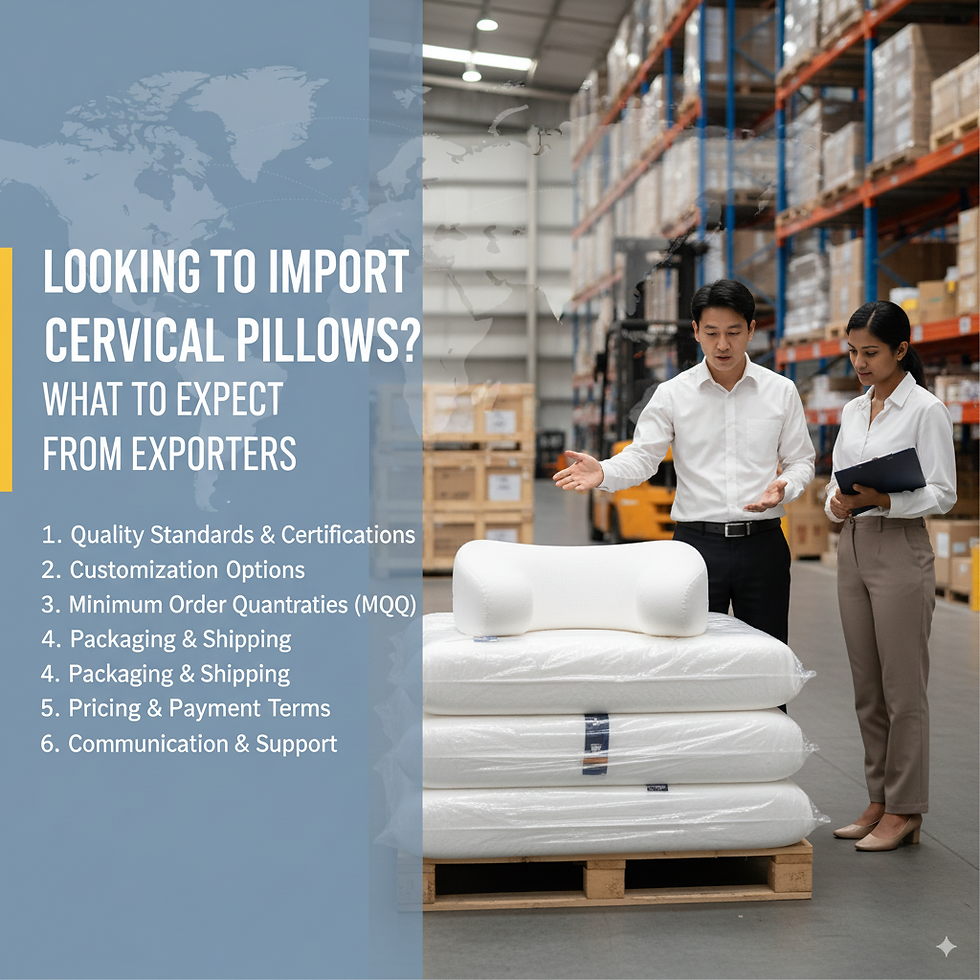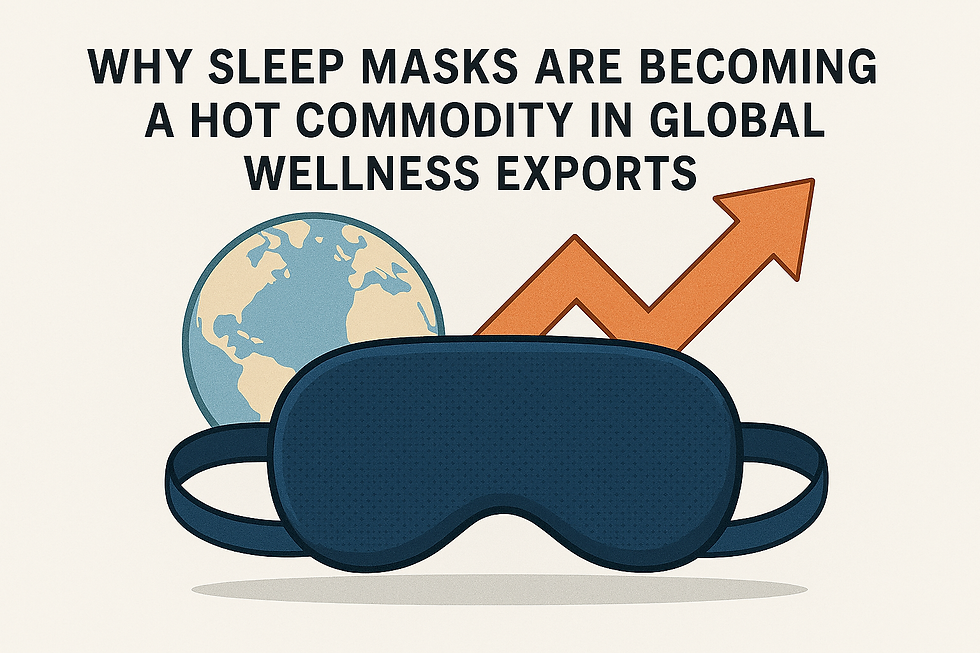Avoiding Common Mistakes When Buying from a Chinese Pillow Manufacturer
- cdeastshore1
- Sep 25, 2025
- 5 min read

The global bedding market is thriving, with pillows being a high-demand product for retailers, hotels, and e-commerce businesses. China, a leading hub for textile manufacturing, produces a vast range of pillows—memory foam, feather, latex, and more—at competitive prices. For B2B buyers, sourcing from Chinese manufacturers offers cost savings and scalability, but it’s fraught with pitfalls that can lead to costly delays, quality issues, or financial losses. Avoiding common mistakes is crucial to ensure a smooth procurement process and high-quality products. This blog outlines five key mistakes B2B buyers often make when purchasing from Chinese pillow manufacturers and provides actionable strategies to navigate these challenges successfully.
1. Neglecting Supplier Verification and Due Diligence
One of the biggest mistakes is partnering with unverified manufacturers. China’s pillow manufacturing sector includes thousands of suppliers, ranging from reputable factories to unreliable intermediaries. Failing to verify a supplier’s legitimacy can result in receiving substandard products, delayed shipments, or even outright scams. Some buyers rely solely on online profiles without checking credentials, risking partnerships with untrustworthy vendors.
How to Avoid It: Conduct thorough due diligence before committing. Request business licenses, ISO 9001 certifications, or factory audit reports to confirm legitimacy. Visit the manufacturer’s facility if possible, or hire a third-party inspection service to verify production capabilities. Check for compliance with international standards, such as OEKO-TEX for textile safety or CertiPUR-US for foam pillows, to ensure quality. Contact references or review past buyer feedback to assess reliability. For example, a verified manufacturer in Jiangsu might specialize in memory foam pillows, offering lab-tested certifications to prove quality. This diligence prevents costly partnerships with unreliable suppliers.
Actionable Tip: Use third-party verification services or request video tours of the factory to confirm production capacity and quality standards.
2. Overlooking Product Specifications and Quality Standards
Assuming all pillows meet your expectations without specifying detailed requirements is a common error. Chinese manufacturers offer a wide range of pillow types—down, synthetic, gel-infused—but variations in materials, density, or stitching can affect performance and durability. For instance, a memory foam pillow’s density (e.g., 40D vs. 60D) impacts comfort, while poor stitching can lead to leaks in feather pillows. Failing to define these specifications can result in products that don’t meet market needs or regulatory standards.
How to Avoid It: Provide precise specifications, including material type (e.g., 100% organic cotton covers), fill weight, firmness, and dimensions. Request samples to test quality before bulk orders, ensuring compliance with standards like REACH (EU) or CPSIA (U.S.) for chemical safety. For example, specify hypoallergenic fills for hotel buyers or breathable fabrics for hot climates. Work with manufacturers to develop a product specification sheet, and include quality control checkpoints during production. This ensures pillows meet expectations, reducing returns and maintaining customer satisfaction.
Actionable Tip: Test samples for comfort, durability, and compliance, and include detailed specs in contracts to avoid miscommunication.
3. Ignoring Minimum Order Quantities (MOQs) and Production Capacity
Many Chinese manufacturers impose high minimum order quantities (MOQs), often ranging from 500 to 5,000 units, which can overwhelm small B2B buyers like boutique retailers. Conversely, buyers sometimes underestimate a manufacturer’s capacity, leading to delays for large orders. Misjudging MOQs or production capabilities can tie up capital or disrupt supply chains, impacting profitability.
How to Avoid It: Clarify MOQs upfront and negotiate terms that align with your budget and demand. For smaller buyers, seek manufacturers offering flexible MOQs or mixed-product orders to diversify inventory without overstocking. For larger orders, confirm the factory’s production capacity—e.g., 10,000 pillows monthly—and request timelines to ensure timely delivery. For instance, a Shandong-based manufacturer might offer lower MOQs for latex pillows to attract smaller distributors. Understanding these constraints prevents overcommitment and ensures a steady supply for your market.
Actionable Tip: Request production schedules and MOQ details early, and negotiate phased orders to balance inventory and cash flow.
4. Underestimating Shipping and Logistics Challenges
Shipping pillows from China involves complex logistics, including freight costs, customs regulations, and packaging requirements. Pillows, especially bulky feather or foam types, can incur high shipping fees due to volume, while improper packaging can lead to damage or contamination. Buyers often overlook these factors, resulting in inflated costs or compromised product quality.
How to Avoid It: Optimize logistics by choosing appropriate shipping methods—sea freight for bulk orders or air for urgent, high-value shipments. Use vacuum-sealed packaging to reduce volume, cutting shipping costs by 15-20%. Partner with experienced freight forwarders who handle textile exports and comply with customs regulations, such as HS code 9404.90 for pillows. Ensure packaging meets standards like moisture-resistant liners to prevent mold during transit. For example, a manufacturer in Zhejiang might offer compressed packaging for memory foam pillows, reducing freight costs while maintaining quality. Plan for customs duties and taxes to avoid surprises.
Actionable Tip: Request packaging samples and negotiate with freight forwarders for consolidated shipments to lower costs without risking quality.
5. Failing to Communicate Clearly and Manage Expectations
Cultural and language barriers can lead to misunderstandings with Chinese manufacturers, causing errors in product specifications, delivery timelines, or pricing. Some buyers assume verbal agreements suffice, only to face discrepancies in order fulfillment. Poor communication can result in receiving incorrect products or missing deadlines, frustrating B2B clients like hotel chains or retailers.
How to Avoid It: Establish clear communication channels, using written contracts in both English and Chinese to outline specifications, timelines, and pricing. Use detailed purchase orders and confirm receipt with manufacturers to avoid errors. Schedule regular updates via email or video calls to monitor production progress. For instance, a buyer sourcing cooling gel pillows should specify exact gel composition and delivery dates in the contract. Employ translators or local agents if needed to bridge language gaps. Clear communication ensures products meet expectations and deliveries align with market demands, maintaining client trust.
Actionable Tip: Use project management tools like Trello or Asana to track orders and maintain clear, documented communication with manufacturers.
Why Avoiding These Mistakes Matters
Avoiding these mistakes—neglecting verification, overlooking specs, ignoring MOQs, underestimating logistics, and poor communication—ensures B2B buyers source high-quality pillows at competitive prices while minimizing risks. Reliable suppliers deliver consistent products, meeting standards for markets like North America or Europe. Efficient logistics and clear communication prevent costly delays, while tailored specs and MOQs align with business needs. These strategies can reduce procurement costs by 10-20% and improve customer satisfaction, critical in a competitive bedding market.
For B2B buyers, such as distributors or hotel procurement managers, these practices streamline operations and enhance profitability. Optimizing online searches for “Chinese pillow manufacturer” or “quality bedding supplier” connects buyers with reputable factories, ensuring access to premium products. In a market driven by quality and efficiency, avoiding these pitfalls positions buyers for success.
Challenges and Opportunities
Sourcing from Chinese pillow manufacturers involves challenges like navigating cultural differences, managing high MOQs, and ensuring compliance with global standards. However, these create opportunities. Verified suppliers with certifications offer premium products, while flexible MOQs cater to smaller buyers. Sustainable materials, like organic cotton or recycled foam, appeal to eco-conscious markets, boosting sales. By addressing these challenges, buyers can secure reliable partners and capitalize on growing demand for quality bedding.
Conclusion
Buying from Chinese pillow manufacturers offers significant advantages for B2B buyers, but avoiding common mistakes is essential to maximize value. By verifying suppliers, specifying quality standards, managing MOQs, optimizing logistics, and communicating clearly, buyers can secure high-quality pillows that meet market demands. These strategies reduce costs, ensure timely delivery, and maintain product integrity, positioning distributors, retailers, and hotels for success in a competitive market. As demand for premium bedding grows, partnering with the right manufacturer is a strategic move for long-term profitability.



Comments